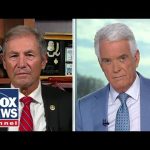Donald Trump recently made a grand return to the international stage, this time in Paris for the reopening of the iconic Notre Dame Cathedral. This event was not just a mere photo-op; it symbolized the return of American leadership to a world stage that has been anxiously waiting for a strong guiding hand. Upon arrival, Trump was greeted with full presidential pomp, including trumpets blaring and the French Republican Guard in full uniform—a treatment usually reserved for current U.S. presidents. It was clear that this was not just a ceremonial event, but a significant political moment signaling that America was back in business.
The highlight of the day was Trump’s meeting with French President Emmanuel Macron, which featured a handshake that quickly went viral on social media. The handshake was reminiscent of the famous bone-crushing grip Trump shared with Macron back in 2017, and many saw it as a clever reminder of who is now calling the shots on the world stage. While Macron’s government has been facing its challenges at home, Trump was making it clear that he is reestablishing American influence around the globe.
As part of his visit, Trump also held talks with Ukrainian President Volodymyr Zelenskyy, advocating for an immediate ceasefire. He hinted at a stern warning for Russia, emphasizing that there would be repercussions if the ongoing hostage situation in the Middle East wasn’t resolved before his inauguration. This kind of assertive diplomacy serves as a stark contrast to the current administration, which seems to be leaving the heavy lifting to Trump while they leap into the background.
Amidst his travels, Trump has begun to be referred to as the “de facto president” by some world leaders, further highlighting a leadership vacuum that many feel exists in the Biden administration. Critics have pointed out that the absence of Biden from key discussions as Trump meets with top leaders only amplifies perceptions of a floundering foreign policy. With Trump stepping into the shoes of a proactive leader, questions are being raised about the effectiveness of the current administration’s approach at a time when clarity and strength are greatly needed.
However, it is important to note that Trump’s messaging resonates with many Americans, especially Catholic voters, as he emphasizes the importance of religion and cultural values. His attendance at the Notre Dame ceremony and mention of its historical significance underscore his commitment to this demographic. By prioritizing cultural and religious issues, Trump is appealing to a segment of the population that felt overlooked in previous electoral cycles.
Ultimately, the unfolding scenes in Paris suggest a shift in the global narrative, where America is positioned to reclaim its role as a leader. With Trump at the forefront, there is a renewed focus on America-first policies, geopolitical strategies, and a reassertion of values. As the world watches with anticipation, Trump’s international debut as president-elect is shaping up to be quite the spectacle—one filled with power plays, cultural assertions, and a definitive message: America is back and ready to make its mark once again.




